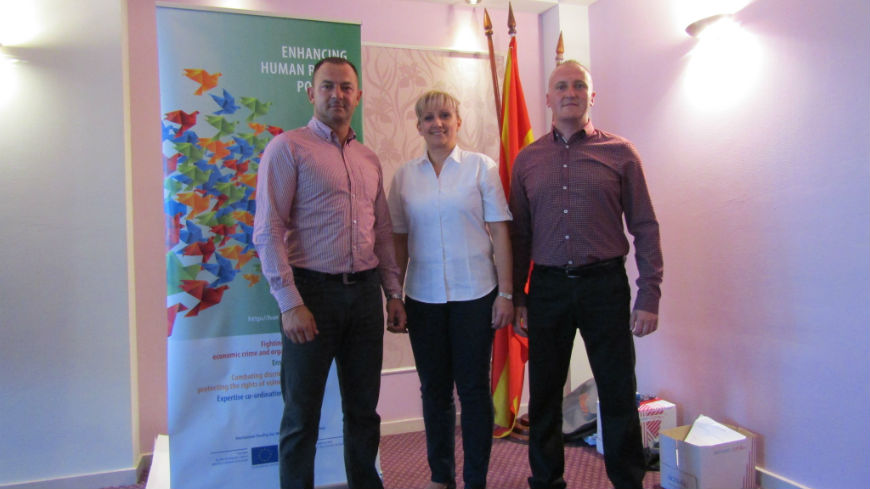A total of 625 police officers have followed our training course on human rights, police ethics and the use of force. The 25 training sessions took place in September 2017 with the co-operation of the Public Safety Bureau of the Ministry of Internal Affairs.
The 2-day training sessions were led by 20 experienced police officers, national trainers, who were trained as part of a previous EU/Council of Europe Joint Programme. The national trainers delivered the training based on three modules for in-service training of police officers: Police Ethics and Human Rights; Apprehension, Deprivation of Liberty and Use of Force, as well as Detention and Prevention of Ill-treatment, which had been previously drafted by a working group composed of representatives from the Public Safety Bureau and the national Police Training Centre, and facilitated by Council of Europe international consultants.
Ms Maja Stojanovska, one of the national trainers for police officers from the Sector for Internal Affairs Skopje said that, “The aim of the training sessions is to make the theory and practice meet, and through interactive training to unify police proceedings and actions taken by all police officers, thus ensuring lawful use of police authority with respect of human rights and by applying the law to all citizens equally.” When asked about her experience in a male-dominated profession, she stated that “No distinction should be made in terms of male or female profession. Rather, the qualifications and merit of police officers should be based solely on their professionalism, lawful proceeding, degree of competencies, police experience, skills to convey knowledge through trainings and high level of police integrity.”
The trainer Ljupco Gjurcevski mentioned the need for carrying out cascade in-service training on these topics for police officers. He stated that in his opinion, “the training was very useful, especially for the younger and less experienced police officers in gaining knowledge on the use of police authority in the practice. By exchanging practical experience and discussing concrete cases with their more experienced colleagues, the participants could detect certain omissions in the way they were carrying out their police duties that could potentially lead to human rights violations. Moreover, the training was helpful in identifying how to conduct lawful and proper police proceedings and how to apply police authority in accordance with human rights standards with regard to the police work in a democratic society and in line with European standards.”
One trainee, Maja Krstevska, expressed her satisfaction with the outcome of the training and focused on the way the training will be applied in her everyday practical work. She said that she had “it was good to refresh knowledge about police proceedings with regard to apprehension, deprivation of liberty, and the rights of citizens when deprived of liberty, in particular in regard to the treatment of vulnerable categories of persons, such as children, pregnant women, elderly and disabled persons, as well as the use of means of coercion in specific concrete situations.” She felt that the most important topics and issues concerning the everyday practical police work are covered in the modules and with the training and therefore, the gained skills will be very useful in her work as a police officer.
Another trainee, Vlatko Bandoski, expressed his hope that such training, “could become regular feature considering their usefulness for the young police officers as they provide an opportunity to discuss the practical implementation of the police-related legislation and procedures with their more experienced police instructors and to ask questions in areas where they lack information.”
The Council of Europe and European Union strongly support the country’s efforts in strengthening the provision of in-service training to police officers through the development of a network of national trainers, who have been provided with the necessary skills to cascade the knowledge to their peers country-wide, thus ensuring viable and sustainable approach to police training. In a long-term perspective, this approach will increase police professionalism and effectiveness thus ensuring stronger ethical behavior and human rights compliance in the everyday police work.
These cascade training sessions were organised within the scope of the Action “Enhancing Human Rights Policing”, co-funded by the European Union and the Council of Europe and implemented by the Council of Europe within the ”Horizontal Facility for Western Balkans and Turkey”.



